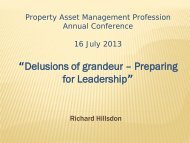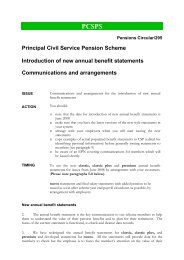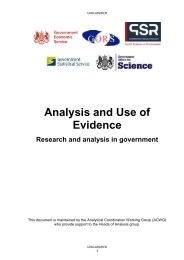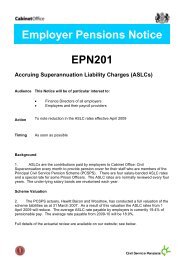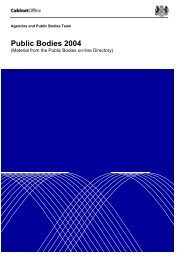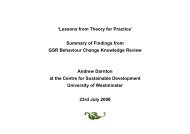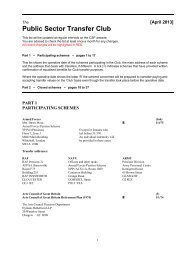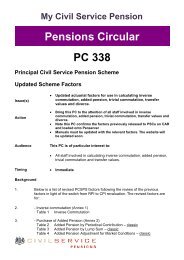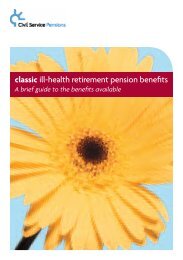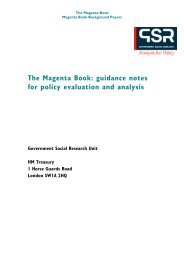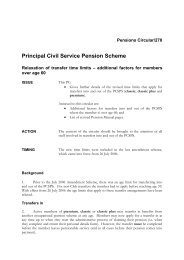Making Car Sharing and Car Clubs Work - Case ... - The Civil Service
Making Car Sharing and Car Clubs Work - Case ... - The Civil Service
Making Car Sharing and Car Clubs Work - Case ... - The Civil Service
Create successful ePaper yourself
Turn your PDF publications into a flip-book with our unique Google optimized e-Paper software.
MAKING CAR SHARING AND CAR CLUBS WORKCASE STUDY SUMMARIESSupport/Consultation1.26 <strong>The</strong> system developed was driven by the staff consultation process, <strong>and</strong> the real need toaddress a clearly identified parking problem. <strong>The</strong> scheme made good use of the travel plancoordinators ability to underst<strong>and</strong> the technical solutions (coming from an IT background),combined with her enthusiasm <strong>and</strong> commitment, <strong>and</strong> ability to motivate those around her.1.27 In developing the scheme, E.ON UK did not use any local authority or consultancy support,but have drawn upon the travel plan best practice guidance notes. This was primarily as aresult of a strong corporate focus, without the need for support. Since launching the schemeE.ON UK have become more aware of local authority support (particularly through theTravelwise team), <strong>and</strong> do coordinate activities with the local authority <strong>and</strong> local businessesthrough the business park Forum.User Perceptions1.28 All users interviewed provided strong support for the scheme (only one of the intervieweessolely used the car share scheme, the other 2 used a range of sustainable transportmeasures, most notable cycling <strong>and</strong> rail). <strong>The</strong>re is clear recognition of the value of the carshare scheme, <strong>and</strong> the professional way in which it has been implemented <strong>and</strong> promoted.All users had noticed a considerable improvement in local congestion around the site, <strong>and</strong>reduced difficulties with parking.1.29 <strong>The</strong> financial incentives were generally considered as a ‘nice perk’, <strong>and</strong> whilst users hadn’tundertaken any specific calculation on savings, they did recognise both the direct financialgain (as a result of the payment for usage), <strong>and</strong> the wider gains associated with reducedtravel costs (in one case, the user had sold-off one of the family cars). In addition, usersexpressed reduced stress levels (from driving on less days), combined with improvedfreedoms <strong>and</strong> flexibilities on working hours (not having to arrive early to ensure a parkingspace).Other General Issues1.30 A number of key messages can be derived from the E.ON UK case study, namely:<strong>The</strong> importance of a well motivated <strong>and</strong> influential coordinator, with allocatedresponsibilities (from the board) <strong>and</strong> a budget to work with.<strong>The</strong> importance on setting an image which meets the corporate identity – not treatingcar share as second class.A strong <strong>and</strong> well organised marketing campaign (not just photocopied posters)A robust technical solution, that enables easy access for usersEnsuring the scheme meets user needs based upon robust questionnaire data analysisOffering a range of incentives for all sustainable modesFinal V1.1, Dec. 2004 - 6 -



